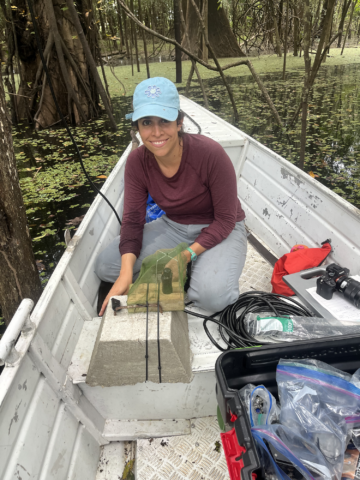Grad Tips: Funding Research-Related Travel
December 9, 2024
By Katya Hrichak
As a graduate student, you have a lot to learn. Scholarship and research aside, there are many facets of the graduate school experience that are important to your success but might not be obvious or easy to figure out. Between achieving a sense of well-being, attending to basic needs, maintaining relationships or caring for others, etc., there’s a lot to keep track of.
The Graduate School is here to help. With the Grad Tips series, we’ll be providing insight into different aspects of the graduate student experience, sharing tips and advice on how to get the most out of your time at Cornell. To vote on the next topic in the series, check for a poll in upcoming issues of the Graduate School newsletter, News and Events.

This week’s topic: Funding research-related travel
Traveling for thesis or dissertation research can be necessary, but it can also be costly. Several units across the university offer grants and awards that can offset the expenses, allowing students to spend less time wondering how to cover the cost of getting to their research locations and more time working on their research.
How can the Graduate School help me fund my research travel?
The Graduate School awards grants ranging from $500 to $2,500, totaling $150,000 annually, in research travel grants (RTGs), funding between 50 and 65 students per year. Grants are awarded through a competitive selection process, and applications are accepted over three cycles, with deadlines of Oct. 1, Feb. 1, and April 1.
To be eligible, students must be enrolled, either full-time or in absentia, in a Graduate School research degree program – M.A., M.S., M.F.A., D.M.A., J.S.D., or Ph.D. – and be registered at the time of their award. Master’s students can apply for an RTG up to their eighth semester of study, and Ph.D. students are eligible up to their 14th semester of study. Research can be domestic or international, and the duration of travel is typically a few weeks.
Master’s students are eligible for awards of up to $1,000 and Ph.D. students, up to $2,500. Travel must be directly related to dissertation and thesis research; conference costs can be offset by Graduate School conference grants. The most successful applicants, according to Graduate School Director of Finance and Administration Kevin Manella, can clearly explain the timing and necessity of their proposed research, along with its impact on the student’s academic progress as well as the research’s broader societal impacts.
“The collection and dissemination of research are fundamental to academic advancement,” said Mannella. “The Graduate School offers RTGs for students to travel and collect original data. There remains much data collection and observation that can only be obtained with travel to that specific destination where it is located, preserved, or produced.”

“Proposals are as wide-ranging as the study of ancient manuscripts in situ, first-person interviews with people who were witnesses to historical events, or time spent collecting observational data from a radio telescope,” he said.
Application cycles are communicated through the Graduate School News and Events newsletter, and the form link is activated on the Graduate School website when the application is live – typically six weeks prior to each funding round deadline.
How can I find support specifically for my international travel?
During the 2023-24 academic year, the Mario Einaudi Center for International Studies – part of Global Cornell – provided $1.4 million in student funding opportunities.
In addition to providing funding to offset travel, Einaudi also prepares students for international fieldwork through mentorship and training.
“The Einaudi Center offers grants to fund international research because actually being in these places is so crucial to understanding complex global issues and the communities of people in world regions that are impacted by and offer unique insights to improving not only their social, economic, and political conditions, but also those of the others,” said Sarah Pattison, associate director of academic programs in the Einaudi Center. “International study is proven time and time again to be one of the most impactful ways to learn about the world and oneself.”
Einaudi offers many graduate funding opportunities, including:
- Einaudi Center Research Travel Grants: These grants of up to $2,000 sponsor international travel for individual Cornell graduate students for activities directly related to dissertation or thesis research by covering international airfare. Travel must begin and end in the U.S., and the minimum duration of stay is 14 weeks while the maximum stay is six months.
- Amit Bhatia ’01 Global Ph.D. Research Awards: These annual awards of $10,000 fund international fieldwork to help doctoral students complete their dissertations. International fieldwork must be a critical component of dissertation research, and awardees must commit to conduct international fieldwork for 9 to 12 months.
- Fulbright U.S. Student Program: Administered through the Einaudi Center, this federal program sends U.S. citizens to more than 160 countries to study, research, and teach English abroad. It is open to current Cornell graduate students.
- Fulbright-Hays Doctoral Dissertation Research Abroad Program: This competitive program supports Ph.D. students pursuing research in modern foreign languages and area studies in countries outside the U.S. with research funding for six to 12 months.
- East Asia Program Research Travel Grants: These supplementary grants of between $500 and $2,000 pay for research and living costs for short-term field research. These grants include the Hu Shih Memorial Award for travel to Taiwan, Lam Family Award for South China research, Japan Research Travel Grant, China Travel Grant for both mainland China and Tibet, and Korea Travel Grant.
- SEAP Engaged Travel Grant: These grants of up to $2,000 fund international study or research in Southeast Asia. Research and professional master’s degree students may apply for these grants with the support of their advisor; doctoral students should instead apply to the Einaudi International Research Travel Grant.
- Michele Sicca Research Grant (through the Institute for European Studies): This grant supports doctoral students launching their dissertation research through preliminary summer fieldwork in Europe.
- Luigi Einaudi Graduate Dissertation Fellowship (through the Institute for European Studies): This fellowship allows graduate students to conduct field and archival research focused on Europe for a duration of four to eight months.
- Abraham and Henrietta Brettschneider Oxford Exchange Fund (through the Institute for European Studies): This fund supports research stays at Oxford.
“Einaudi is committed to travel funding because it is core to our mission to organize, stimulate, and support graduate education and prepare graduate students to contribute to the international sphere,” said Pattison. “We simply need more thoughtful, deeply knowledgeable, and respected global thought leaders!”
Pattison encourages students to apply for grants, regardless of the application’s outcome, to hone the skills of presenting one’s work and ideas to grant-funders. And, even if students do not receive the award for which they applied, Einaudi staff may be able to direct them toward other opportunities they may be eligible for.
“Most of the professional staff and faculty of the Einaudi Center have been transformed by their international travel, so you are in such good hands when you come to us for support,” she said. “We want Cornell graduate students to be transformed by international travel and, in turn, become someone that can transform the world around them.”
Can I find research travel funding through my college or school?
Travel funding may be available through your college or school. A few opportunities include:
- Industrial and Labor Relations International Travel Grants: These limited $500 to $2,000 grants can be used to support the international fieldwork component of graduate students’ research projects, conducted during the summer or winter break. While grants are open to all undergraduate and graduate students, the grants are not intended to support research master’s and doctoral students who have access to research funds.
- College of Agriculture and Life Sciences (CALS) Graduate Student Grants: These $1,000 to $10,000 grants are available to CALS graduate students for travel expenses related to research. Funding opportunities under this umbrella include Andrew W. Mellon Student Research Grants, Arthur Boller Research Fund, Kieckhefer Adirondack Fellowships, and Smith Clinton Dewitt Fellowship.
- College of Architecture, Art, and Planning Funding Opportunities: The $10,000 John Belle Travel Fellowship is open to M.Arch. and Ph.D. students in architecture, historic preservation, and/or urban design during the second-to-last year of their programs.
Are there other units on campus that offer funds for research travel?
There are units on campus that offer funding for research travel.
The Center for the Study of Inequality awards seed grants of up to $1,000 to support original scientific research on inequality and can be used to cover travel to and from research sites as a supplement to travel funds provided by the Graduate School or individual fields.
The Lab of Ornithology oversees the Frances M. Peacock Scholarship for Native Bird Habitat, which awards up to $4,500 for work in the U.S. on habitats of threatened or endangered bird species that can provide information for land-management decisions. Graduate students who are U.S. citizens at any U.S. institution are eligible to apply.
How else can I learn about research travel funding opportunities?
Speaking with your director of graduate studies, graduate field administrator, and other students in your field or discipline is always a useful way to learn more about opportunities available to you.
